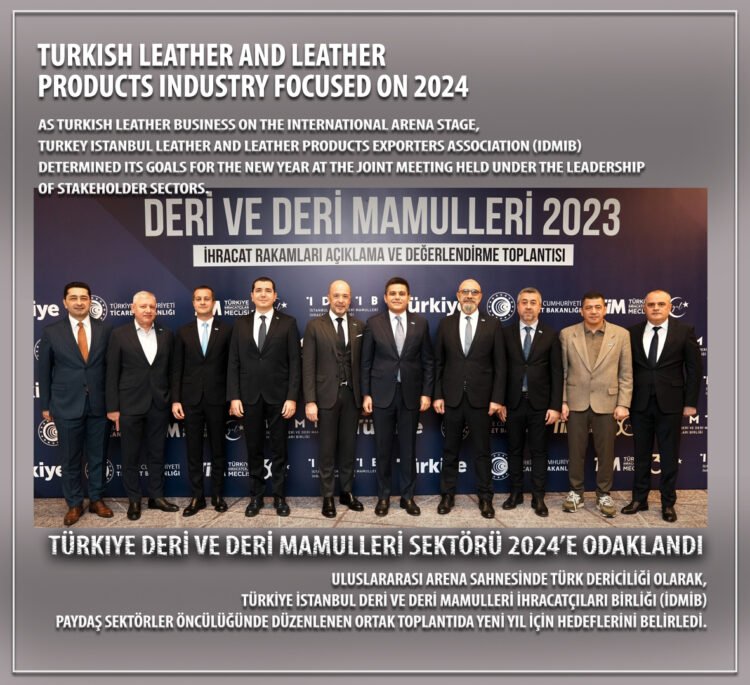As Turkish leather business on the international arena stage, Turkey Istanbul Leather and Leather Products Exporters Association (IDMIB) determined its goals for the new year at the joint meeting held under the leadership of stakeholder sectors. İDMİB President Güven Karaca stated that Turkey’s leather and leather products export figures and export figures for 2023 and 2024 decreased by 9.5 percent: “Our exports reached 1 billion 860 million dollars. This decline is a negative development, but it is also a positive situation for our industry. While the Turkish average in exports per kilogram is 1.71 dollars, as the leather and leather products sector, we reached a value of 11.35 dollars in exports per kilogram.” said.
It was stated that the Turkish leather and leather products industry will accelerate the 2024 targets on a significant scale by organizing a 2023 evaluation meeting. They held a press conference together with the President of Istanbul Leather and Leather Products Exporters Association of Turkey, IDMIB, and the Presidents of the sector’s stakeholder NGOs, and made statements about the place of the Turkish economy in the sector, the previous year’s export figures and increasing raw material costs.
Reminding that the Turkish Leather and leather products industry closed the year 2022 with an export of 2 billion 58 million dollars, Güven Karaca said, “In this export, our shoe industry was our locomotive industry and broke export records. Likewise, records came from our Saddlery sector. We broke the biggest records in the history of the Republic of Turkey. We started 2023 with different agendas. The first half of the year was spent with the earthquake disaster and the election that devastated the whole country, while the agenda in the second half was the rational measures taken by the new economic management. Despite all the negative developments in the first half, we, as a sector, managed to increase our exports by up to 15 percent. However, after June, exports began to decline. Our capacity utilization rates, which were around 72 percent, dropped to 62 percent. “We experienced a total decline of 9.5 percent on the export side in 2023.” said.
Emphasizing that the largest market in Turkey’s leather and leather products exports is the European Union, Güven KARACA said, “37 percent of our exports are made up of EU countries. The former Eastern Bloc countries follow with a share of 19 percent. Middle Eastern countries rank third among our export markets with a share of 12 percent. It is predicted that there will be a contraction in export markets in 2024 after 2023. The contraction in world trade is expected to follow a parallel course. In other words, no major development is expected in world trade. However, the future should not be planned with today’s realities. We have to realize more efficient production by creating a vision.” said.
Referring to the problems experienced on the financing side, Güven Karaca continued his words as follows: “Today, financing is very expensive and production is difficult. However, these conditions should not get in our way. We must continue marketing and take care to participate in fairs. On the other hand, the size of trade in the world reached 30 trillion dollars. 5 trillion dollars of this comes from e-commerce. As Turkey, we should also get a larger share from e-commerce, we should work for this. “We are not very pessimistic about this issue.”
Güven KARACA, who said that when the financing and inflation problems of industrialists and exporters in Turkey are left aside, the biggest problem is ‘human resources’: “It is worth saying very clearly. Human resources are not sufficient for our sectors. However, human resources and education are not issues that we can solve overnight. On behalf of our sector, we work to bring more demand to universities and high schools by collaborating with vocational high schools and universities and giving scholarships to students. One of the most important issues here is to remove the minimum wage debate from an arrangement between employer and employee. Because we have to protect employee peace. Approximately 60 percent of wages in Turkey are either at the minimum wage level or very close to the minimum wage. These fees are the same everywhere in the country. That’s why we must now implement regional minimum wage.” said.









